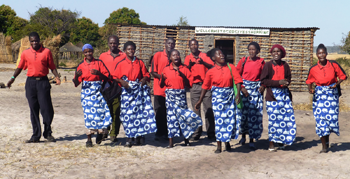ABM Archive Website
THIS WEBSITE CONTAINS ARCHIVE MATERIALS FOR HISTORICAL REFERENCE ONLY
For up-to-date information, including our latest appeals, news, and resources, please visit our current website.
Passion for their Valley
 |
| Lui-Mwemba Gender Development Action Group outside their shop. © ABM/Beth Snedden 2013 |
Twenty kilometres and seven hours walk from the main road, along deep sandy tracks, is Lui-Mwemba Public School (population 1,300) located in the Lui River Valley, Western Province, Zambia – there is no public transport to or from the village.
There are numerous socio-economic problems in the Lui River valley (5,405 population) – limited employment opportunities, access to health facilities (4-5 hours to a clinic) and higher education, low representation by police/victim support officers, poor agricultural soil, and poor road network hinders access to markets for selling produce or buying necessary medicines and fertilisers. In the wet season the valley floods and commute to other villages is by canoe.
The plight of women and children in this area has been exacerbated by negative cultural practices: female child marriages, wife beating and rape, child beating, child labour, defilement (child), land rights and gender inequity.
Through the Zambian Anglican Council’s (ABM’s Partner) Gender & Governance Initiative, the Lui River chiefs and community selected 20 volunteers (10 women, 10 men) from the valley to form a Gender and Development Action Group (GAD) who are tasked with sensitising the communities about negative cultural practices.
Monica Mvula, program manager, stated, “The biggest challenge with regard to Gender Based Violence (GBV) is that there has been too much silence. If we can break the chain of silence, we can begin to change…”
This sensitisation group is active, excited and engaged by their work. They utilise creative means to communicate their message about negative cultural practices – group written drama, dance, songs, and poems, community traditional dancers, and reflection sessions – and the impacts are being felt in the communities.
One village head man said: “I have learned something today – I do not have to wait for my wife to put water in the kettle. I can do it myself, and it is not a wrong thing to do.”
The Lui-Mwamba public school hall is a key site for the valley communities with the grounds used for community meetings under a large tree – villagers canoe or walk in from all over the valley. A school room is used as a base for the Action group’s business meetings, and their income generation project has been built on the grounds – a community grocery shop.
The group’s income generation project commenced with a ‘seeding’ grant from ANCP (the AusAID NGO Cooperation Program) funds. It is both a source of income for the Action group volunteers, and a vital provisioning point for the valley – selling vital items to villagers (school supplies, basic medical, hygiene and laundry items, and basic dry food goods) at affordable prices. This saves the villagers a long walk to nearby towns, where prices are overly expensive. The group have established a revolving loan initiative (for group members) saving surplus funds to buy a threshing machine that can be used by the local communities who currently have to commute long distances to have their grain threshed or grounded.
 |
| Mamba Kangombe |
The Zambian Anglican Council has partnered with the Lui-Mwemba Public School (under the auspices of the Ministry of Education).One of the positive unexpected outcomes from this project is explained by the Acting Principal of Mwemba Public School, Mamba Kangombe. He writes, “The Gender and Governance project has been exceedingly helpful around the lives of the people in Lui-Mwemba community. Our school experienced a lot of girl-child drop-outs, girl-child under-enrolment and high rates of girl-child absenteeism. Since the inception of this project…(it) has helped the school much as can be evidenced that: girl-child dropouts have been reduced, girl-child enrolments in the school is progressively surpassing that of the boy-child, and girl-child absenteeism has practically reduced. Furthermore, many parents have developed positive attitudes toward gender equity, equality and human rights, children’s rights inclusively.”


